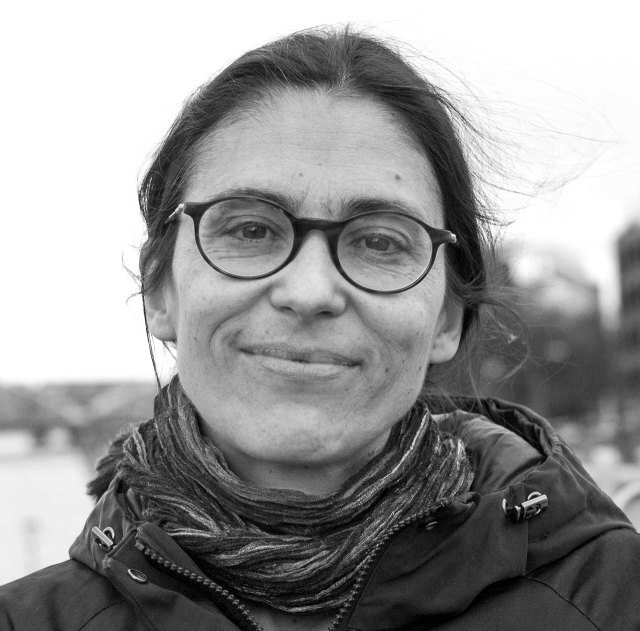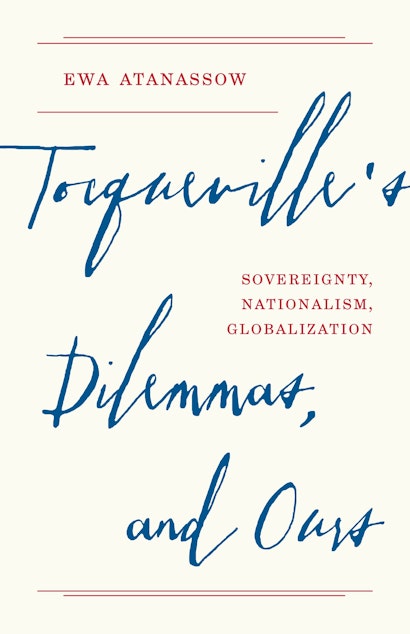How can today’s liberal democracies withstand the illiberal wave sweeping the globe? What can revive our waning faith in constitutional democracy? Tocqueville’s Dilemmas, and Ours argues that Alexis de Tocqueville, one of democracy’s greatest champions and most incisive critics, can guide us forward. Drawing on Tocqueville’s major works and lesser-known policy writings, Ewa Atanassow shines a bright light on the foundations of liberal democracy. She argues that its prospects depend on how we tackle three dilemmas that were as urgent in Tocqueville’s day as they are in ours: how to institutionalize popular sovereignty, how to define nationhood, and how to grasp the possibility and limits of global governance.
SC: Your book titled Tocqueville’s Dilemmas, and Ours: Sovereignty, Nationalism, Globalization has just come out this month. To begin, I’m curious to hear how the book took shape. What motivated you to write it?
EA: My main motivation was to understand what seems to me one of the most urgent questions of our moment: the crisis of liberal democracy as a global model, and of liberalism both as an institutional framework and a normative vision for how to organize democratic life. Many books are being written on this topic, from a variety of viewpoints: some welcoming the current disaffection as a stepping stone to a post-liberal world, others seeking to alleviate the perceived crisis, and defend liberal democracy. I stand firmly in the second camp.
What distinguishes my attempt is that I elaborate a comprehensive view of the current discontents by drawing on the thought and practice of Alexis de Tocqueville, a canonical 19th century liberal, who is among the most perceptive critics both of modern democracy and of the United States as its paradigmatic liberal instantiation. I do so in order to show that our travails are not unprecedented, and that alongside historically contingent challenges, there are structural issues—what I call dilemmas—at play. Moreover, I suggest that the most illuminating account of these dilemmas is not necessarily the most contemporary: i.e., we stand to learn from the past.
So I wanted to achieve three things with the book: first, to enhance our understanding of Tocqueville by foregrounding neglected aspects of his work; second, to show how Tocqueville’s theoretical and policy analyses bear on today’s issues; and third, to raise methodological questions of two sorts: how to read past thinkers and draw on their lessons to address the present; and how to translate historical and theoretical insight into policy or political practice.
SC: The subtitle of your book highlights sovereignty, nationalism, and globalization. Why were these phenomena important for Tocqueville, and why are they important for us?
EA: The book’s main claim is that sovereignty, nationalism, and globalization are pivotal for Tocqueville’s view of modern politics and its constitutive challenges. Since these are also the challenges democracies are grappling with today, Tocqueville’s work continues to be relevant and instructive. This claim may raise eyebrows. For one, few readers of Tocqueville have taken note of the account of sovereignty, and of popular sovereignty, which runs through his work. This lacuna in the scholarship was a shocking discovery for me. Further, Tocqueville does not speak of nationalism (a term that acquired currency late in the 19th century), or of globalization (a late 20th century concept). Nevertheless, I argue that, while lacking some of our vocabulary, Tocqueville had a sharp understanding of the phenomena and the political and moral dilemmas they present.
Beyond clarifying Tocqueville’s thought and practice, the book seeks to establish, with Tocqueville’s help, that all modern societies are democratic in the sense of being based on the principles of equality and popular sovereignty, but differ in the way they define and institutionalize these principles. Note that openly authoritarian regimes, such as Russia and China, Iran or North Korea, conduct elections and claim to be the legitimate expression of their peoples’ will. They are also egalitarian, often in more radical ways than liberal orders. By virtue of their democratic nature, modern societies have to grapple with questions such as: How to construe the principle of popular sovereignty that legitimizes all modern regimes?; How to define and mobilize the civic allegiance that national sovereignty relies on? And how to negotiate the processes of globalization that are often at odds with democratic legitimacy? Hard-wired, so to say, these questions are also interrelated and entail difficult trade-offs between centralized power and participatory freedoms; between national cohesion and individual rights; between compliance with transnational norms and accountability to particular constituencies or peoples. By calling them dilemmas, I want to suggest that, rather than simple either-or choices, these questions must be continuously negotiated, and negotiating them is what much of modern politics is about.
This matrix of dilemmas also helps me redescribe liberalism in a way that underscores its relevance for our time. Liberalism as I define it is a long tradition of thinking about and approaching these constitutive modern questions. Rather than seeing liberal politics as siding with one horn of each dilemma, I want to show its historic range and flexibility. As Tocqueville’s pioneering critique of individualism helps us appreciate, liberalism is not reducible to economic freedoms or individual autonomy, as many today tend to think. Nor is it antithetical to state sovereignty or to national identity but rather relies on a certain understanding of these concepts. That it has a globalist bent—which in the 19th century was synonymous with European expansionism—entails a history that we view critically today, and which Tocqueville viewed critically back then. As I argue, on pressing issues such as race or the structural and moral contradictions of colonialism, his probing analysis anticipates contemporary critiques. This is not to say that Tocqueville always got things right, but he was uncommonly prescient in raising the thorniest questions of our time, and we’ll do well to learn even from his errors.
SC: You argue in the book that this globalizing tendency comes from the universal pretensions of liberal democracy’s principles. If this “globalist bent” is rooted in the foundation of liberalism, how can one be a liberal critic of globalism? Posed another way, can one be universalizing without being imperialistic?
EA: Thank you for raising this possibly most urgent question. First a clarification: what I argue, by looking at Tocqueville’s foreign policy writings (many still unavailable in English) and by comparing Tocqueville and Marx, is that both thinkers see globalization as a defining aspect of modernity. Yet while Marx and his followers ascribe this globalizing tendency to capitalism, Tocqueville ties it to democratization, and to the “irresistible” and “providential” (as he called it) rise of democratic equality. For Tocqueville, then, the globalist bent is not specifically liberal as much as it is generally democratic, and I again insist on the distinction. One evidence for Tocqueville’s thesis is that anti-liberal and anti-capitalist regimes, of which the Soviet Union was the most successful (and, one should add, murderous) example, were no less imperialist. We are confronting in Ukraine the ramifications of this imperial legacy.
Put differently, liberalism is not the only universalist ideology out there. Marxism-Leninism is another, as is political Islam (whose rise Tocqueville was among the first to recognize). In this view, the modern world is characterized by a contest for global leadership and a competition of universalisms of one kind or another. What, then, distinguishes the liberal version? And what should guide Western efforts to shape global governance today? My Tocqueville-inspired answer is: pluralism and moderation—moderation which follows from recognizing the stubborn fact, but also intrinsic value of human diversity. What I mean to underscore is that, though sharing common features and inalienable rights, human beings are divided into a great multitude of groups and peoples, each with its own distinct vision of human dignity and what it means to live a good life. This plurality, as Tocqueville put the point, may be ‘fatal’ when it leads to violent and destructive disagreements. But just as on a national, so too on an international level pluralism is integral to the possibility of freedom, not least by helping to contain hegemonic or imperialist ambitions.
In other words, liberalism Tocqueville-style is both particularistic and universalist. While fundamentally committed to the protection of individual rights, and beholden to the Enlightenment’s universalist ethos, liberal democracy is premised on a respectful regard for the historical experience and particularity of peoples. If this view is valid, it would mean that liberalism betrays itself and becomes incoherent when it embraces (as it did after the presumed end of the Cold War) messianic end-of-history narratives seeking to refashion the world in its own image.
SC: This seems an appropriately aporetic point to end a conversation about a book on dilemmas. As always, I’m left with more questions than I began with: How can the particular and the universal be reconciled? What exactly does that familiar liberal concept ‘tolerance’ mean? And how can we avoid political messianism? Your book addresses these challenging questions (and many others) head on and provides conceptual tools that can help us move through such seeming aporias. Thank you for your book and for this conversation.
EA: Thank you, Schuyler.
Ewa Atanassow is Professor of Politics at Bard College Berlin. Her books include (with Alan S. Kahan) Liberal Moments: Reading Liberal Texts and (with Richard Boyd) Tocqueville and the Frontiers of Democracy. Schuyler Curriden is a graduate student in philosophy at the Humboldt-Universität zu Berlin, having studied previously at Deep Springs College and Bard College Berlin. He works primarily with Ancient Greek philosophy, political philosophy, and the writings of W. E. B. Du Bois.

